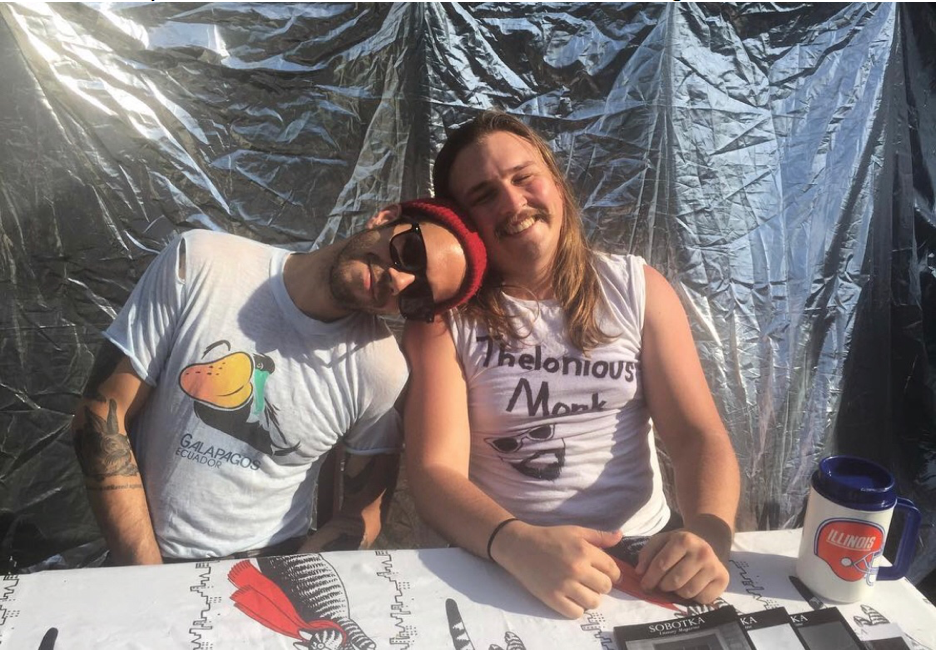by Susan Visakowitz
There’s no doubt that the Coronavirus pandemic has made things a little tougher for Eric Tyler Benick and Nick Rossi, the co-founders of Ursus Americanus Press. But not as much as you might expect for two good friends trying to jointly-run a very small press from two different cities (Chicago and Brooklyn).
Sure, not being able to see each other for more than a year has been hard—not to mention that book releases and other events that would have otherwise brought UAP authors and readers together for discussion, celebration, and, yes, a few beers, have been on ice since this all began. But scrappiness, a focus on what really matters and nothing more, is Benick and Rossi’s calling card.

As Benick recently told Boog City in an interview conducted by email, “Our dreams, like us, are simple: stay alive and make books.” And so that’s exactly what they’ve been doing, carrying on through the pandemic with the same devotion to “make art real” that has always guided them.
The two men met on account of a reading series Benick used to host in Nashville called “Life is Boring.” Rossi was a regular contributor, and as the months passed they bonded over coffee, beer and a shared set of influences and principles, including hip-hop, punk rock, an aversion to ideology, and, of course, a love of poetry. Benick floated the idea that they should start publishing chapbooks, and, just like that, Ursus Americanus Press was born.
UAP publishes four to five chapbooks a year at an initial run of 100 copies. Benick and Rossi operate the press out of their apartments, having made a commitment from the start not to get involved with large distributors like Amazon and SPD. “We would love the work to reach more people,” explains Benick, “but have no interest in expanding beyond a two-person operation or dealing with insidious resources.”
That sort of fierce independence reflects the punk influence that runs in the veins of UAP. “My approach and ethic in publishing has much more to do with punk labels than presses,” says Rossi. “I admire the dedication to community, diversity, and accessibility of Dischord Records and Don Giovanni Records. Their roots are planted, their rosters have always pushed for representation, and their prices aren’t unnecessarily inflated. That commitment to art and artists rather than profit inspires me.”
And you can see that commitment in the chapbooks themselves, which are designed with a curator’s eye. “We aim to make sharp little pieces of physical media that you’d pick up if you saw it sitting on a friend’s coffee table or on the shelf at your favorite bookstore or forgotten on a train platform,” says Rossi. Part of that striving for a striking physical product stems from the influence of Rossi’s father, who has worked as a printer since graduating high school. It’s for this reason UAP works only with local print shops, and Benick explains, “We have unnegotiable [sic] dimensions that we use for every chapbook and a stationery preference that we have found through trial and error.”
As for what the press has been up to, UAP recently put out its first collaborative chapbook: Matthew Cooperman and Simonetta Moro’s A Little History of the Panorama. “The way the text and the image are in conversation is both intimate and expository in a way that felt fresh to me,” says Benick. The press plans to publish two more collaborative chapbooks this year, but up first is Michael Chang’s Chinatown Romeo, which Benick says are “some of the best poems I’ve ever read.”
As far as how they determine who to publish, Benick and Rossi decline to articulate an “aesthetic ideology” (Benick’s words), in keeping with their general ethos, but do offer that they look for work that feels, according to Rossi, both “completely new and unfamiliar” and “that makes the familiar feel completely new.” They each name albums from hip-hop artists like Kendrick Lamar, 2Pac, and Nas among their most treasured works of poetry, as well as collections from George Oppen, Roger Reeves, Susan Olds, and Natalie Diaz.
Benick and Rossi have another outlet for sharing what they love with the world: Landfill, an online-only literary journal that publishes bimonthly. Rossi describes it as “a space [where] we can keep our eyes and minds fresh re: what we’re into and looking for in poetry. I still envision it as a space to compile and hopefully attract work from people who are doing something we dig.”
But there’s no doubt that making physical objects available in the real world is a primary motivation for UAP, and one way in which the pandemic has taken its toll. “With everything pushed digital, we lose part of what we love about running a press that’s focused on making beautiful objects and the risk of burnout due to lack of emotional nourishment is high,” says Rossi. “Our passion is printing not posting, so having to engage with publishing exclusively online this past year has been grating.”
Still, one doesn’t get the sense that UAP is going anywhere; there’s just far too much fire and grit at the beating heart (really, the beating hearts) of this operation to slow it down. “We didn’t start this press as a stepping stone to something bigger or better or ‘more real’ in any professional or artistic sense,” declares Rossi. “This isn’t meant to be a line on a CV or … some strange ill-conceived pathway to money and power. This, working fully within our means to make solid little books that pay for themselves, is the Real Thing as far as we’re concerned.” And so it is.
www.ursusamericanuslit.com
ERIC TYLER BENICK is the author of the chapbooks I Don’t Know What an Oboe Can Do (No Rest Press) and The George Oppen Memorial BBQ (The Operating System), as well as co-founding editor of Ursus Americanus Press. His work has appeared or is forthcoming in Southeast Review, Bat City Review, Armstrong Literary, Washington Square Review, 3 a.m. Magazine, Birdcoat Quarterly, and elsewhere. He lives in Brooklyn.
NICK ROSSI is a co-founder / editor / designer at Ursus Americanus Press, Sobotka Lit Mag, and No Rest Press. He’s the author of two chapbooks: Young Professional (No Rest Press) and Remind (Match Books). His work has recently appeared in or is forthcoming from Schuylkill Valley Journal, Rejection Letters, Hooligan Mag, Funny Looking Dog Quarterly, Columbia Poetry Review, and elsewhere. He lives and works in Chicago.
 SUSAN VISAKOWITZ is a poet and painter who loves to tell the stories of fellow creative types. She got her start reporting on music for various small blogs and eventually publications like Billboard magazine. Currently she is focused on a new series of art projects under the name Exiting In. Instagram: @exiting_in
SUSAN VISAKOWITZ is a poet and painter who loves to tell the stories of fellow creative types. She got her start reporting on music for various small blogs and eventually publications like Billboard magazine. Currently she is focused on a new series of art projects under the name Exiting In. Instagram: @exiting_in

